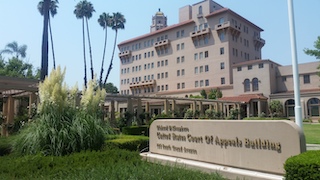If you have stumbled upon this article through a Google search, it may be because your search terms included the Violent Crimes in Aid of Racketeering Activity statute, 18 U.S.C. § 1959, a federal law.
To support a VICAR conviction, the government must show: “(1) that the criminal organization exists; (2) that the organization is a racketeering enterprise; (3) that the defendants committed [or attempted or conspired to commit] a violent crime; and (4) that they acted for the purpose of promoting their position in [or gaining entrance to] the racketeering enterprise.” United States v. Bracy (9th Cir., 1995) 67 F.3d 1421, 1429.
When a VICAR allegation is made, a RICO (Racketeer Influenced and Corrupt Organizations Act) claim is commonly also made. Insofar as a RICO claim is made as it defines racketeering under VICAR, racketeering is defined as “any activity or threat involving murder, . . . [or] extortion . . . which is chargeable under State law and punishable by imprisonment for more than one year” and “any offense involving . . . the felonious manufacture, importation, receiving, concealment, buying, selling, or otherwise dealing in a controlled substance . . . punishable under any law of the United States.” 18 U.S.C. § 1961(1)(A), (1)(D). RICO was enacted by section 901(A) of the 1970 by the Organized Crime Control Act. It famously has been used to prosecute the Hells Angels, many mafia entities (i.e., the Gambino family) and Michael Milken for insider trading.
 U.S. Ninth Circuit Court of Appeals Pasadena
U.S. Ninth Circuit Court of Appeals Pasadena
It is against this framework that the Ninth Circuit recently reviewed an appeal of a conviction and thus sentencing under VICAR taking place in the U.S. District Court for Central California. The underlying case involved many individuals prosecuted for their alleged conspiracy to conduct the affairs of the Orange County branch of the Mexican Mafia (“OCMM”), through a pattern of racketeering activity that included extortion, drug trafficking and attempts to commit and successful attempts to commit murder.
For approximately three years Susan Rodriguez served as “secretary” for Peter Ojeda, the leader of the OCCM, and for her ex-husband, Tommy Rodriguez. In that capacity as secretary, the evidence showed that she delivered messages to members of Mexican Mafia (“La Eme”) and their “mesas” (i.e., leadership teams), collected and disbursed “tax” money earned from extortion, and, ultimately, conspired to murder gang members who were deemed a threat to Ojeda’s leadership. She also delivered messages to members to use violence upon those who threatened Ojeda.
The case went to trial and the jury returned a verdict of guilty on two counts: (1) conspiracy in violation of RICO, and (2) conspiracy in violation of VICAR. The judge, James V. Selna, sentenced her to 78 months in federal prison.
Ms. Rodriguez appealed her conviction, arguing that the jury was improperly instructed that “it is not necessary for the government to prove that the required motive was the sole purpose, or even the primary purpose of the defendant in conspiring to commit the charged crime. You need only find that enhancing the defendant’s status in the alleged enterprise was a substantial purpose of the defendant or that the defendant conspired to commit one or both of the alleged crimes of violence (i.e., murder or assault resulting in serious bodily injury) as an integral aspect of membership in the enterprise.”
Ms. Rodriguez argued that the jury should have been instructed that it needed to find her only purpose in delivering messages, collecting and disbursing “tax” money earned from extortion and in conspiring to murder gang members who were threats to Ojeda was to enhance her reputation within La Eme and that of La Eme.
The United States Court of Appeals for the Ninth Circuit disagreed with Ms. Rodriguez, finding that one can have more than one purpose in doing what she did, but to convict her, the jury needed to only find that one of her purposes in doing what she did was to enhance her own reputation within La Eme or to enhance the reputation of La Eme.
This argument by Ms. Rodriguez was characterized by the appeals court as a “but for” argument, meaning that she was arguing the jury had to find Ms. Rodriguez only had one purpose in doing what she did.
The appeals court declined to hold the prosecution to such a high standard and commented that most events and work one does has more than one purpose. As long as one of the purposes was to help conduct illegal racketeering and violent acts, her conduct could support her convictions.
We bring this summary to the reader’s attention because this argument is a common one and it is an incorrect statement of the law, as this case found.
The citation for the U.S. Ninth Circuit Court of Appeals ruling discussed above is United States v. Susan Rodriguez (9th Cir., 2020) 971 F. 3d 1005.
For more information about federal criminal sentencing in general, please click on the following articles:
 U.S. Ninth Circuit Court of Appeals Pasadena
U.S. Ninth Circuit Court of Appeals Pasadena